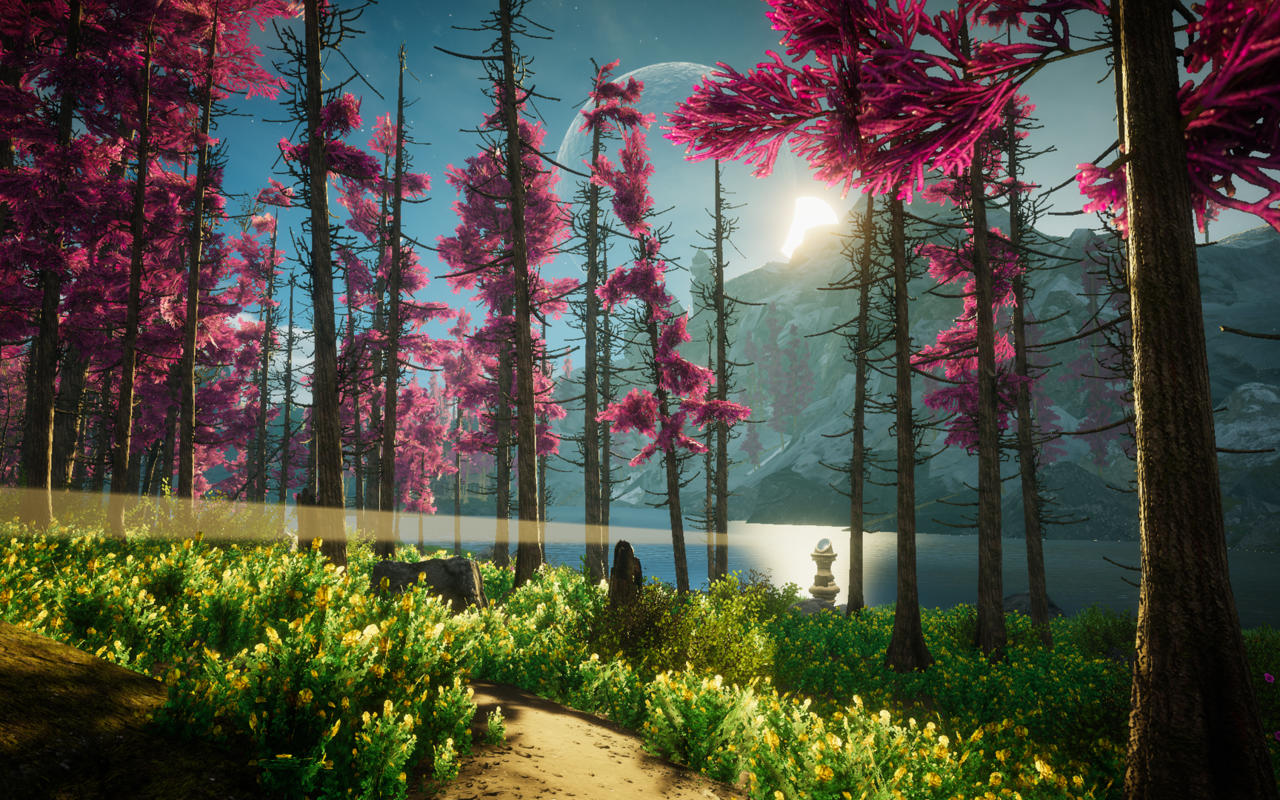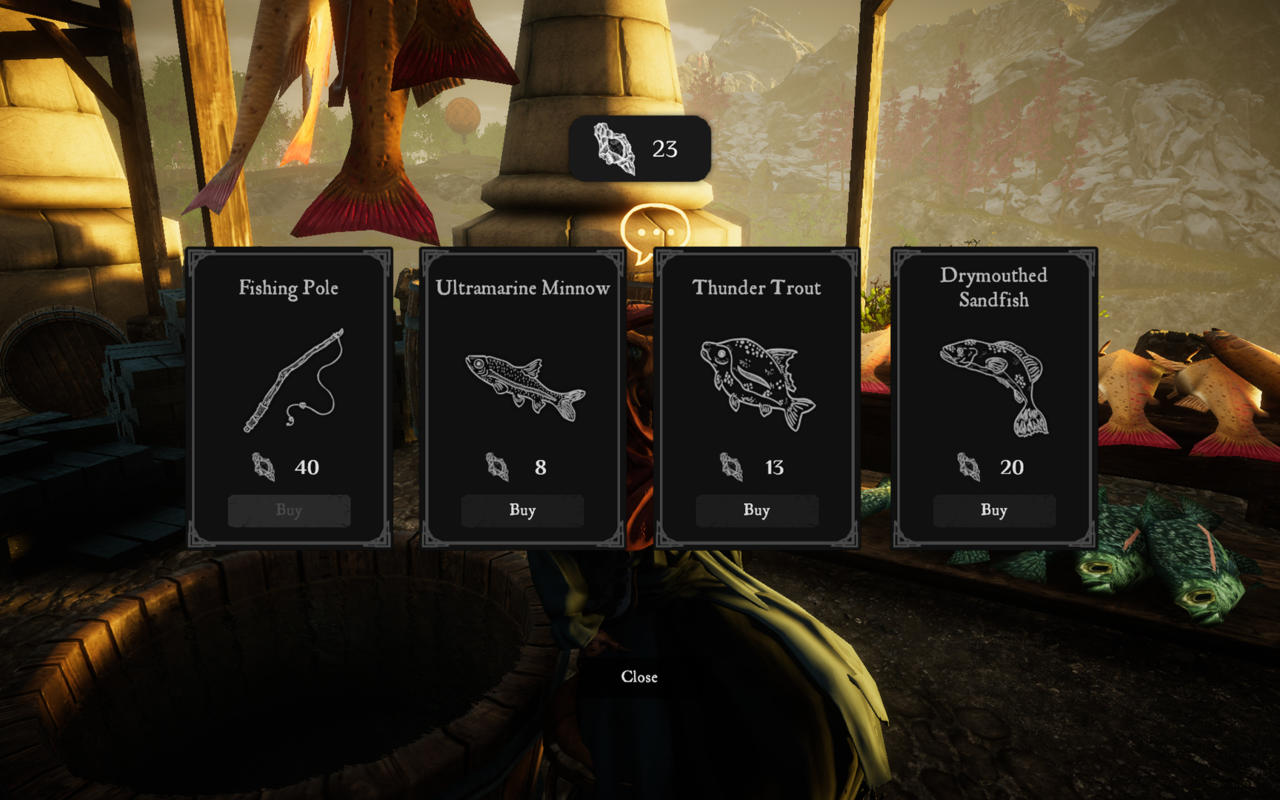There's a blacksmith, toiling away in the markets of the capital of Nava, who thinks making swords is boring. Why create something, she argues, when death is its only use? She'd rather make a kettle any day of the week. So I bought her kettle, and now I can brew all kinds of delicious, and at times mysterious, tea whenever I hole up and camp in the wilderness. And I still haven't found a sword.
Eastshade is a non-violent, first-person adventure game set in a rolling open world full of quests. Imagine an Elder Scrolls game was an old boot, and you picked it up, turned it upside down and shook it until all the combat and magic and loot, every orc and dragon and bandit fell out. Then you took a shoehorn and eased a walking simulator inside the wrinkled leather before setting off on a delightful stroll across the countryside. Eastshade is just about the loveliest, prettiest, and just bloody nicest game I've played in years.

You play an artist, recently shipwrecked in Eastshade near the small coastal village of Lyndor. After a kind chap finds you on the beach and lets you rest in his cozy cave until you recover, you resume your journey to visit and then paint your just-passed mother's favorite places in Eastshade. It's a simple setup, paying tribute to a lost loved one, and it's indicative of the kind of sincere, touching gestures you'll carry out over the course of the game.
The flow of Eastshade will be familiar to anyone who has played an open-world RPG in recent years. You speak to NPCs, at first enquiring about the local history and points of interest before delving into something more personal and finally unlocking a unique quest. A child and aspiring painter asks you to help her acquire some art supplies. A smitten merchant wants some advice on how she should pursue her romantic interest. A park ranger needs your assistance in catching and caring for an injured waterfox. Not everyone has a story to tell--there are plenty of mute, generic NPCs filling the streets--but the ones you do meet almost always open up to you in the sweetest of ways.
Most quests involve tracking down the next person in the quest chain or venturing afar to find a particular item. Some, however, require your talents as an artist. Indeed, it seems that once an Eastshadian discovers you can paint, they're quick to realize how much they'd really like some oil on canvas hanging over the fireplace. One keen art-lover asked me to paint him a picture of a chicken, so I made my way over the markets where I'd earlier spied some chickens nestling among the hay, set down my easel and painted the perfect poultry portrait.
The act of painting itself isn't simulated in any way. You simply use the mouse to drag a frame across the screen. Anything within that frame is then captured, rendered in a painterly style, and reproduced on the canvas. In essence, you're taking screenshots. As such there's much pleasure to be had in framing your subject, as anyone who has unearthed the joys of a game's photo mode can attest. I was asked by a particularly pompous villager to paint his portrait, and fully capture all his self-described nobility and heroism. He was sitting in a tavern at the time, next to a huge fireplace whose chimney stretched to the double-story ceiling, so I framed him as this tiny figure dwarfed by the imposing stone furnace. He was grateful, of course--I'm sure the game logic merely checks if the required subject is in the frame--but I found it extremely satisfying.

At a certain point you will also gain the ability to register with another local artist and begin taking commissions to earn glowstones, the local currency. It functions much like a job board: you check in, accept the gig, then return later with the finished painting and collect your cash. Each commission gives you a description of the type of painting desired and it's up to you to figure out where you need to go and what you need to include in the frame. Some are easy to identify, like a specific request for a windmill, but you may have no idea where to find it. Others are more vague, like a “starry cavern” or a “natural arch.” Either way, it's enjoyable to have your memory of the landscape tested as you struggle to recall elements of the terrain.
Sometimes you won't have a spare canvas to paint on, meaning you'll have to obtain the materials necessary to craft a new canvas. Fortunately, there are wooden boards and piles of cloth lying around the various towns and villages, and NPCs don't seem to mind at all if you walk into their homes and grab some. It's a good idea to thoroughly explore every area and collect any such craftable materials as there doesn't seem to be any limit on how much you can carry. I found I typically had enough canvases to complete quest-critical paintings, but if I'd wanted to paint for fun, as it were, I would have had to tediously wait for previously collected materials to respawn or spend my hard-earned glowstones to buy them.
Money's tight, you see, and there are other things worth purchasing. This isn't an RPG, so you won't be selling loot to finance your endeavors--though there is a sort of joke merchant who will buy anything off you for the princely sum of one glowstone. However, there are items you will need in order to access new areas of the world. A coat, for example, lets you continue to explore the countryside during the cold nights, while a tent lets you camp outdoors overnight or simply rest for a while if you need to meet someone at a certain time of day.

You'll find yourself walking a fine line between securing what you need to complete your current tasks and saving up to afford what you need to unlock new quest possibilities. I remember standing in the markets and agonizing over whether to spend what little money I had on a fishing rod (because one quest wanted me to catch a particular type of fish) or a kettle (because my pockets were already bursting with all different kinds of plants and herbs). It was a genuinely stressful moment in a game otherwise conducted entirely in serene contemplation.
Eastshade is a slow game. There's an awful lot of walking, or running once you realize there's the option, and you'll spend almost all your time trekking back and forth between villages or strolling across town from one shop to the next, ferrying this item to that person and hoping to speak to so-and-so about this-and-that. It would quickly grow tiresome were it not for the dinky penny-farthing bicycle you can buy and the presence of craftable fast travel items, and more importantly, the immense natural beauty found in every corner, along every path, and over every crest of the world.
Indeed, Eastshade is a slow game that moves at just the right pace. From the warm, golden sunlight filtering through the dense canopy of the Great Tree to the pools of water on the terrace farms that skirt the city glittering in the morning light, you'll constantly find yourself stopping to catch your breath. Even after treading the same cobbled road a dozen or more times, hours later I would still find myself admiring the scenery, expansive vistas and minute details alike.

The pace perfectly complements your actions, too. This is a game about taking your time and paying attention to the environment through which you're moving. You have a quest log and a map of the land, but there are no quest markers or waypoints telling you where to go. You have to read the lay of the land and remember details of where you've been. As you travel, the geographical contours of the world gradually become imprinted in your mind until you could paint them almost from memory alone. Almost.
By giving you a paintbrush (and a kettle) instead of a sword, Eastshade is a rare first-person open world game that's not about killing but rather about doing good deeds, helping people see the error of their ways, and bringing communities together all through the power of art. It's a breath of fresh Eastshadian air and a genuine, unironic feel-good game. Now, if you'll excuse me, I'm going to put the kettle on.







































